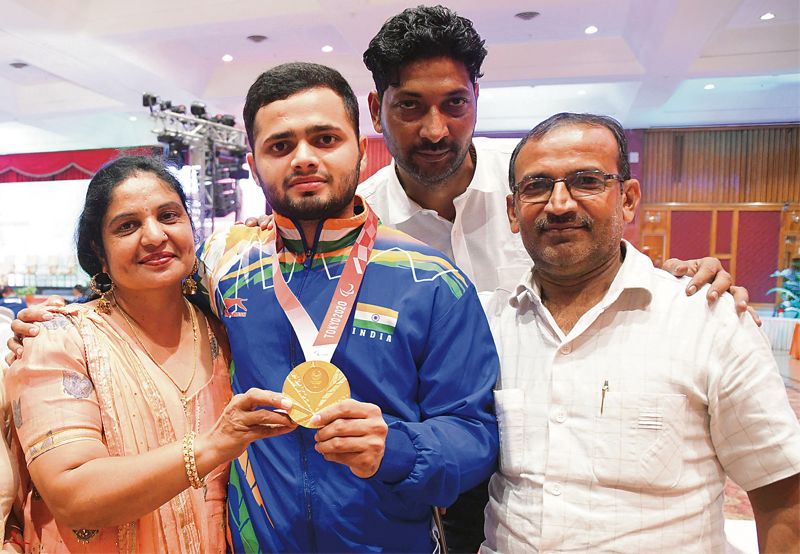
Manish Narwal with his family | Gold, Shooting
Renu Sud Sinha & Sarika Sharma
A mother’s tears and courage, a wife’s unshaken faith, a father selling off the family fortune, a sister’s near-total devotion — these are just some of the factors that have allowed Indian para-athletes to bring home 19 medals from the recently concluded Tokyo Paralympics, of course, apart from their own grit, dedication and hard work.
In a country where parents hardly encourage even able-bodied children to take up sport, to blindly support a differently-abled child and even invest the family’s fortune to let him/her pursue their sporting dreams, speaks a lot about the bravery and resilience of the families of these para-athletes.
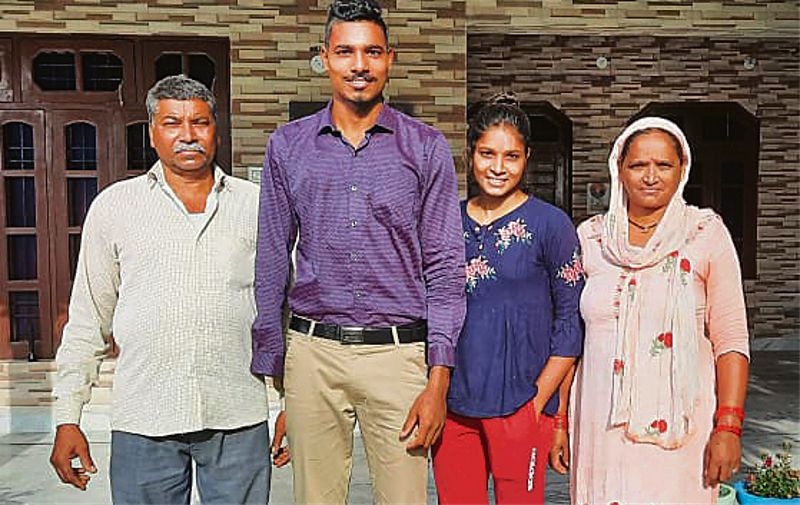
Silver, High Jump
It takes a village...
“Will it grow back?" Nishad Kumar’s mother and sister don’t remember how many times he asked them this question after he lost his hand at the fodder-cutting machine. Pushpa Devi had been busy cutting fodder that day. Nishad was home too. The mother didn’t realise what had happened until the nine-year-old started screaming in pain. She rushed to switch off the machine, but it was too late. Nishad’s hand had been severed. Pushpa Devi fainted.
The villagers soon gathered and Nishad was taken first to Amb, the nearest town, and then to Hoshiarpur. But the arm couldn’t be saved. The family returned home, aghast at the turn life had taken. The hand would not grow back, but neither Pushpa, nor her husband, nor sister Rama had the heart to tell him that.
Week after week passed, but the pain in their hearts didn’t subside. Three months later, one day Pushpa Devi handed her son a pen and a notebook and told him to start writing with his left hand. “You have to practice for an hour every day. We have to do it,” she told Nishad. Soon, father Rashpal revived his routine of taking the son and daughter for a run in the mornings. Within a year, Nishad was writing fluently and doing other activities with relative ease. Life was finally beginning to look normal. Pushpa Devi was crying lesser.
Today, Nishad Kumar from Badaun village in Himachal Pradesh’s Una district is a Tokyo Paralympics silver medal winning high jumper, his 2.06m leap an Asian record. The mother doesn’t want the credit for herself and her family alone. They say it takes a village to raise a child. It was an entire supportive ecosystem that turned a maimed young boy of nine into a Paralympian, a medal winner. Pushpa Devi says they will always remain grateful to the physical education teacher, Ramesh, who pushed him to take up sport, and Meenakshi Sharma, the principal at Saraswati Vidya Mandir, where he was studying at the time.
“He has made the village proud,” says the mother. She doesn’t cry any more. If at all she does, they are tears of joy.
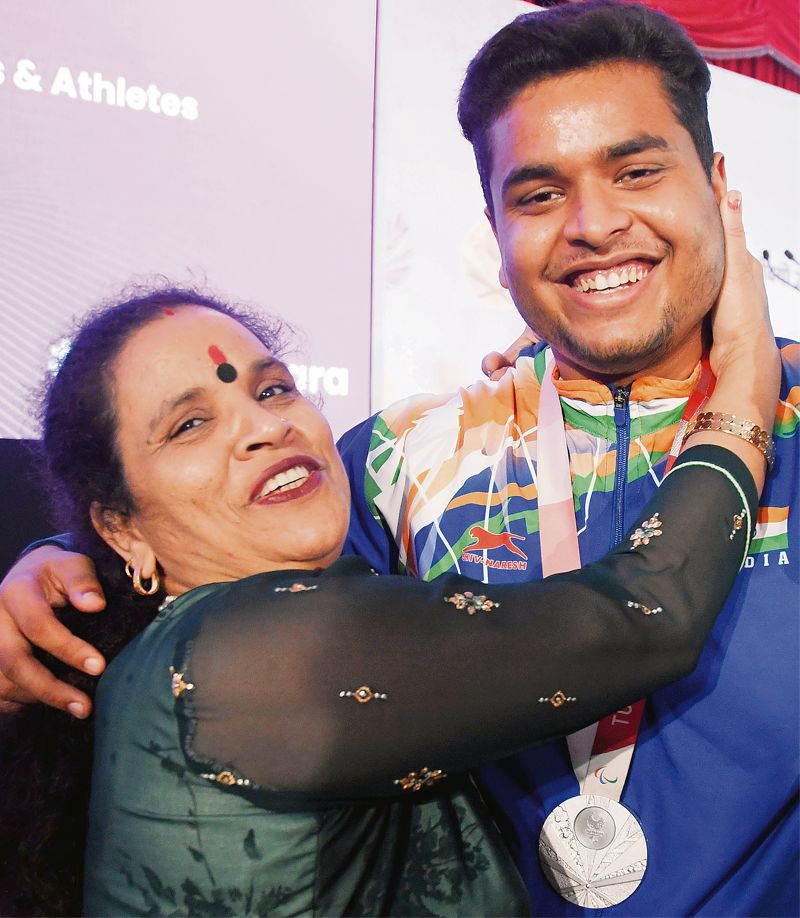
Silver, Discus
The mother’s resolve
Jhajjar-based Meena Kathunia’s story is no different. Her son Yogesh (24) was eight when a rare infection (Guillain-Barré) that affects the nerves put him in a wheelchair. The doctors treating Yogesh told her that only a miracle would make him walk again. In their medical wisdom, they, perhaps, didn’t count on a mother’s resolve. “Physiotherapy was the only possible solution. Physio sessions cost Rs14,000 a month, much more than my husband’s salary,” recalls Meena. Short on funds but not determination, she “learnt” physiotherapy from the staff at the Chandimandir Cantonment hospital in Panchkula, where her husband was posted. Within three years, Yogesh was walking again.
Bullied at school because of his disability, a decade later the silver sheen of his Paralympics medal in discus throw has been a balm to the dark days of the past. That was the time Meena would tie little Yogesh to her waist and drive him on a scooty to various doctors in hope of a cure. From hakims in remote villages to babas, the mother literally went to every corner. “I had heard about a baba near Jaipur. He lived in a temple in the middle of a forest. For 20 days, we stayed in an open shed. It was quite scary but I can still do it all over again if I have to,” says Meena.
For a mother with three kids to raise, Meena never had much to spend on herself. So, what does the prize money of Rs4 crore mean to her? “My son gave me the entire sum. Some of it will be used to pay back the loans taken for his training, a bigger house perhaps here at Bahadurgarh, and of course, for his future training expenses,” Meena trails off, as she hopes for an easier life.
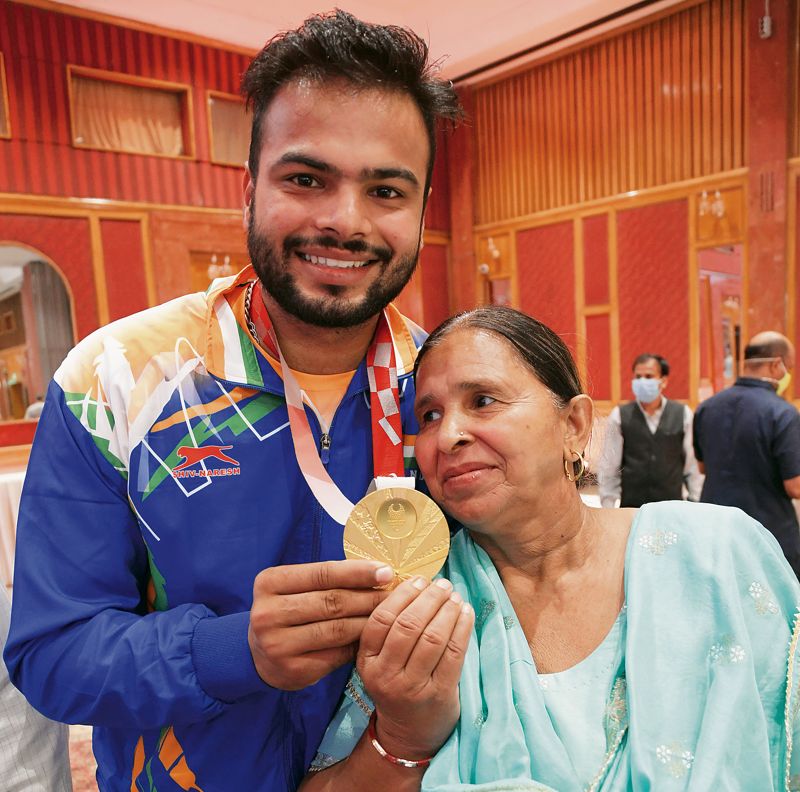
Gold, Javelin
Blood & glory
Sonepat-based Nirmala Antil had to be mother and father to her children when she lost her husband in 2004. Nirmala put on the cloak of resilience and quietly went about raising her four kids. But life wasn’t done with her yet. In 2015, her only son, Sumit, a young strapping lad of 17, met with an accident. His left leg had to be amputated. A Class XII student, Sumit, who was passionate about wrestling, couldn’t come to terms with fate’s brutal blow. Nirmala not only had to deal with a depressed teen, but also society’s ‘sympathy’.
“People would say ‘bechari ka jawan beta langda ho gya’. And that would affect him more. He refused to meet anyone, coming out at night only.” Nirmala became his armour and motivation, encouraging him to go for an artificial limb and a normal life. And she succeeded to a large extent. Armed with a prosthetic leg, Sumit got admission in Ramjas College in Delhi to pursue BCom. It was tough but his efforts at normalcy were so successful that for two years even his best friend at college didn’t know about the artificial leg.
In 2017, para-athlete Raj Kumar introduced Sumit to the world of para sports, and the rest, as they say, is history, paved though with the bloodied stump of a determined young athlete and a mother’s courage. “He would practice for hours, barely sleeping two-three hours, and often coming home with a bleeding stump. I would dress his wound and ask him to go back for practice the next day.”
Perseverance isn’t the only value Nirmala has handed to her son. After his gold, when the Haryana CM asked Sumit to name any wish, he asked for better facilities for his village (Khewra), including a stadium, a health centre, potable water and sewage facilities. “Many youth have taken to drugs. A stadium will give them a better direction to life,” says Sumit.
With a Paralympics gold in hand and a world record to his name, what are the plans for future? For Sumit, it’s more medals of the same metal and for his mom, a simple, sweet bahu for her son, who would make him his favourite besan ka halwa and always take care of him, as Nirmala has.
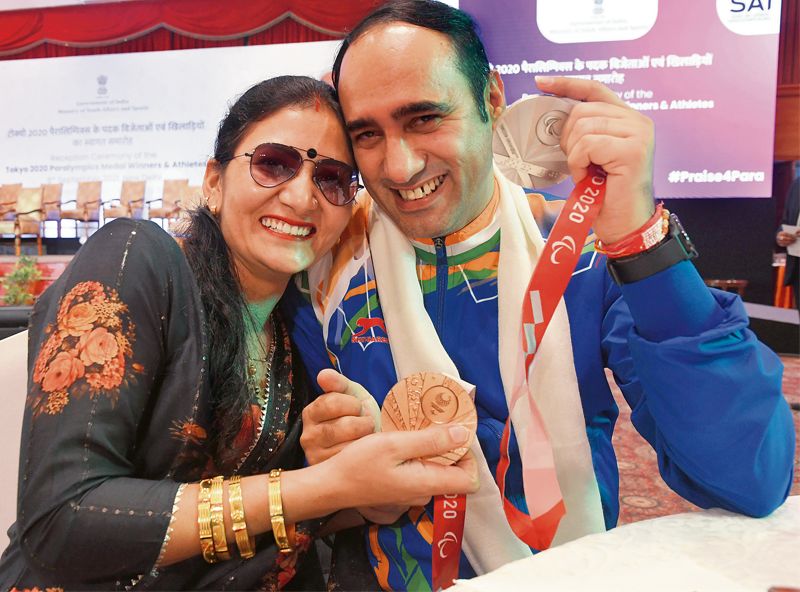
Silver & Bronze, Shooting
Shooting couple
When her 35-year-old polio-afflicted husband, Faridabad-based Singhraj Adhana, asked wife Kavita, a mother to two sons, for her gold jewellery so as to pursue his passion for shooting, a costly sport, she didn’t hesitate even once, handing him the entire lot to buy his first pistol. Didn’t she think about her young sons? “I had complete faith in him. He is a good man who has always helped others. I wanted him to pursue his passion. My kids were young. There was enough time to rebuild life, in case of any setback.” Her faith was justified. Within a year, Singhraj won his first national gold and four years later, he has got not one but two medals, a silver and a bronze, at the recent Paralympics.
His wife has been the pillar on which Singhraj’s success story rests. “For four years, I have given him total freedom from all responsibilities — be it kids, his parents or other family responsibilities,” says Kavita, who also acts as his manager, managing his schedule, correspondence, etc. As she is always with him during his practice, on Singhraj’s suggestion, Kavita has also taken to shooting. She was ranked fifth in National Shooting Championship in 2020 and first in Haryana — a befitting companion to a Paralympics medallist.
A house for a gun
Gold medallist and champion para shooter Manish Narwal has the highest regard for his father Dilbagh Singh and mother Santosh Devi. He knows what it took his parents to turn him into the shooter who smashed the Paralympic Games record in Tokyo and won a gold medal. It is the ultimate fruit of their years of sweat and blood, a reward for the innumerable visits to neem-hakims that began the moment Manish was born. It is also a confirmation that no handicap is too big to overcome.
Born with an impairment in the right hand and shoulder since birth, Santosh Devi says they visited many doctors and therapists in the hope that the arm would work. The visits ended only when he turned 14 and they decided to stop trying further. “The doctors at AIIMS were ready to operate on him but there was no guarantee that the surgery would be successful. Besides, there was further danger of nerve damage,” she recalls.
Encouraged by his father, Manish took up shooting, a sport that was pretty expensive for the family to support as Dilbagh Singh’s small-scale industry of cutting and bending iron tools was under a mountain of debt in 2015. However, sensing Manish’s seriousness for the game, he decided to sell off their small house in Faridabad to raise funds for his first pistol and moved to a rented apartment. Santosh Devi still remembers how the father never revealed his plans to the family until the deal had been sealed. “The house was sold for around Rs8 lakh. The pistol cost Rs2.5 lakh then. Most of the remaining money too was spent on the boy’s shooting,” Manish’s uncle Hari Singh recalls.
Over the years, things have improved for the Narwal family. Dilbagh’s unit is flourishing and the family has moved to a bigger house at Shahupura in Ballabhgarh. But the struggles have not ended for the parents; they have increased three-fold. Shikha and Shiva, Manish’s younger siblings, have taken up shooting too. “My mother now has to take care of the diet needs of three shooters,” says Manish, adding with a grin that he has lost to the siblings during training.
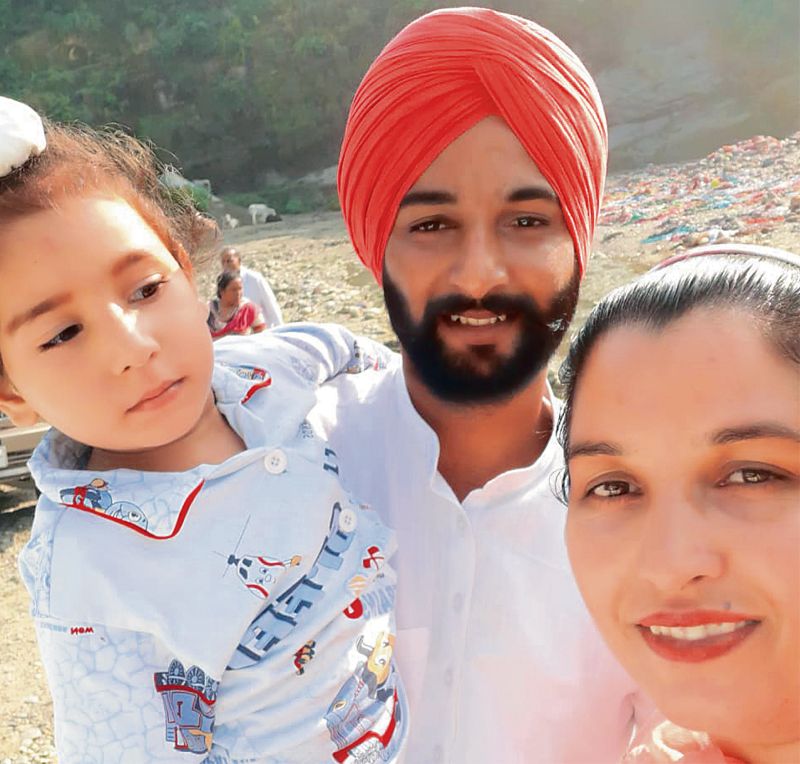
Bronze, Archery
Her brother’s shadow
Mocked at by the kids they would play with, Harvinder’s sister Sandeep Kaur and brother Arshdeep would rush to lift him up. With a leg not functioning, he would often fall. “I remember our mother would feel so bad that her son was not at par with others,” recalls Sandeep, currently at the family home in Ajitnagar village of Kaithal district in Haryana.
The family has been together ever since Harvinder Singh won India its first medal, a bronze, in archery at the Paralympics. Only the mother isn’t there to celebrate his success. She passed away a month before Harvinder won a gold at the 2018 Para Asian Games. He had dedicated his win to her, the woman who had slogged for him all her life, while living with diabetes, which claimed her ultimately. He had cried profusely that day.
Harvinder was 18 months old when an injection to treat dengue fever left him impaired in one leg. Surgery after surgery followed, in Chandigarh, then Delhi. The mother, Harbhajan Kaur, was by his side for weeks at a go. “Wherever she saw hope of his leg being cured, she took him. Sometimes they would visit hakims in Malerkotla, staying there for two-three months. Back home, she would keep massaging his legs. She just wanted him to stand on his feet somehow,” recalls Sandeep, who was almost a shadow of her brother whenever he was around.
She would ferry the two little brothers to school on the only cycle they had. At school, lunch was eaten together, whereafter Sandeep would wrestle her way to the tap to bring water for the two. With legs often plastered, spells of absence from school were long. “I would go to his teachers to get his school work and help him do it,” she shares.
And when it came to preparing for the Paralympics, the lockdown meant another test. “The small house did not provide the required length. So, once wheat had been reaped, the farm was turned into a training ground,” says Arshdeep. Harvinder’s winning the medal was as much his mother’s dream as his. One goal achieved, he might finally fulfil her other dream also: of seeing him getting married.
— With inputs from Vinayak Padmadeo
Join Whatsapp Channel of The Tribune for latest updates.



























